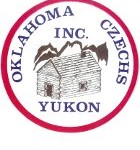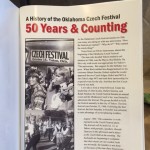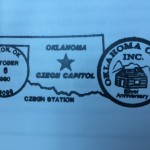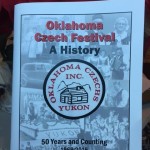Category Archives: Polka-Dancing
Origin of Polka
The origin of the polka goes back to 1830, to the town of Kostelec, Bohemla, where a young glrl, named Anicka Chadlmova, while taking care of her master’s children, teaching them to sing and dance, invented her own dance in 2/4 time. Soon the village heard about this, including the village teacher Josef Neruda. He was the first to write the tune down in music and called the dance “Pulka”, which means “half” (of 4/4 time) and “krok” which means “step”. Soon the Pulka got to be called POLKA, the same as today. Its popularity was introduced to Prague about 1835, and in 1839, was brought to Vienna by the musical band of the Prague Sharpshooters, a military unit. The music and dance met with extraordinary acceptance. .In 1840 it was received with tremendous applause at the Odeon Theatre in Paris and was soon the favorite dance at all the private and public balls. It spread rapidly into every country of Europe and is now popular allover the world. It was brought to America by the immigrants. It survived many other dances-and is much danced today, 179 years after its invention. The polka tempo is much used by Czech composers, but is not found in the works of classical Polish composers nor those of other nationalities. Websters New World Dictionary of the American Language says: “POLKA -Czech ‘pulka’ -fast dance for couples, developed in Bohemia in the early 19th century.”
As often is the case, Anicka Chadimova did not benefit in any way from her dance step. After an unhappy marriage, she died as a pauper. The teacher, Josef Neruda’s life was also unhappy, and during the night of April 8, 1876, was murdered in his home. The murderer was never found.
~Submitted by LaVerne Benda
THE BEER BARREL POLKA
The Beer Barrel Polka comes from a Czech love song by Jaromir Vejvoda, of Zbraslav, Czechoslovakia named “Škoda Lasky”. The words to Škoda Lasky are of a sad love song. The Beer Barrel Polka was brought to England by Czechoslovak airmen during World War II. The translated lyrics became General Dwight D. Eisenhower’s favorite melody. He had the author come to England to thank him personally for the morale building effect of the song.
~Submitted by LaVerne Benda
History of Czech Hall Bands
Bohemian Knights Band
George Miskovsky Band played before WWII. Much of the music used today has his name stamped on the front of the sheet music.
Milo Belsky and his brothers started playing after brother Joe got out of the Army. Joe played alto sax, Milo played trombone, and Charlie played sax and trumpet. Paul Smith started playing trumpet with the band when he was fourteen years old. Charlie picked him up and drove Paul to the dances. Jerry Kaplan played tenor sax and accordion, Jim Masopust played drums, and Speedy Walker played piano.
The Belskys owned a refrigeration manufacturing business and many floral units, walk in units and beer cases are still working. When Milo’s trombone slide was sticking, he just poured beer down the tube and the slide started working. He drank the rest of the beer. Milo obtained the baby grand piano from the officer’s club at Fort Sill in Lawton. It is still used today on the Czech Hall stage. After brother Joe passed, Milo retired and Charlie Belsky directed the band. He later called the band the Polka Stars. Then in 1958, Jerry Kaplan directed the band and changed the name to the Jerry Kaplan Orchestra. His daughter Joyce played piano and was the vocalist. John Simpson ran the band after Jerry passed.
In 2004, Milo Shedeck took over the band and named it The Bohemian Knights in honor of Toni, Charlie Belsky’s widow. Milo plays sax and clarinet. Milo found a world class accordion player named Dick Albreski and his band can play all types of music with most of the sheet music arrangements done by teacher and accordionist Albreski. He is originally from Erie, Pennsylvania. His other players are: Kenneth Leck on drums, Mike Nielsen and Mark Guinn on trumpet, and Neal Hickerson on tenor sax. His other players have been Paul Smith, Mike Forcina, Cory Johnson, Scott Shedeck and Bob Bright on trumpet, Tim Hanna on tuba, Scott Rohr on drums, and Ken Elliott on tenor sax. Milo Shedeck also played in the Belsky, Kaplan, Vitek, and Masopust bands.
Other local bands that have played at the Czech Hall have included: George Miskovsky, Bob Vitek, Ed Novey, Ernie Divis, John Simpson, Charlie Rolivich, and Bessie Masopust . Paul Smith played in all the above Bands except the original George Miskovsky Band.
The Masopust Polka Band
Specializing in Czech polkas, waltzes, and specialty dances, is a family band that traces back five generations to the year 1890.
Circa 1890, Czechoslovakian immigrants, Joseph and Katheren Masopust, came to Oklahoma from Nebraska, settling in the central portion of the territory (around the Mustang area).
Joseph Masopust, along with his sons, James Joe, Frank, and Lou, and also family friend and neighbor, George Kralik (the same married Annie Hubatka), formed the first Czech polka brass band, namely, The Masopust Polka Band. This was the first generation of the Masopust family to carry the band.
Joe Masopust, the eldest son of James, reorganized the band in the mid-1920’s, adding drums, piano, and a variety of traditional and contemporary music of the time. The band’s pianist, Bessie Drabek, and Joe were married in 1927. The band was carried on by Joe, Bessie, and their son, Glenn, who played the trumpet. This was the second generation of the Masopust family to carry the band.
In 1975, David Masopust joined the band as the tuba player. David’s joining of the band marks the fourth generation of the Masopust family to be a band member. (There were no members from the third generation of the family.)
After Joe Masopust passed in 1978, Bessie continued the work of driving the band forward. Under her leadership, the band produced two albums: the self titled album in 1981, and Phase II in 1992. Bessie passed away in 1997. David Masopust then became the fourth generation of the Masopust family to carry the band.
In 1996, William “Bill” Masopust, son of David and great-great-grandson of Joseph, joined the band as the drummer. That brought the band to the fifth generation of the Masopust family.
As of now, this is not the end, as the sixth generation of the Masopust family has been born.
Czech Customs
Taken from Czech Reflections
By Willa Mae Cervenka
Holy Wednesday Czech and Slovaks call the Wednesday of Holy Week, “Ugly Wednesday”. There is superstition that anyone eating honey on this day will not be stung by serpents. The church bells are muffled, their place being taken by great wooden rattles in the church towers.
Holy Thursday In Czech Republic, Holy Thursday is called “Green Thursday”. The hawthorn is supposed to weep on that day; according to tradition, it is the tree from which the crown of thorns was fashioned. Parents send their children to the brooks to bathe on Green Thursday; it is a cure for laziness. At breakfast the Czechs and Slovaks eat honey and “Judas cakes, cakes twisted like rope.
Good Friday Holy Friday is known as “Great Friday” in Czech Republic. On that day anyone can look upon the sun without being blinded by its glare. Moveover, all hidden treasures are revealed to those seeking them before sunrise. An ancient ballad tells of a woman who went before sunrise of Great Friday to a mountainside. The rocks opened and she beheld quantities of shining gold. Hastily laying down her child, she filled her apron with gold and then ran home for a larger vessel to hold more treasure. By the time she returned, the sun was up and her child was shut up in the mountain. A year later she returned to the same spot before sunrise; the mountain opened and she found her child alive and well.
For Good Luck In a new home the Czech people plant rosemary and oleander at the front door for good luck.
Czech Fortunes In Czech Republic, fortunes are told after dinner on Christmas Eve. Melted wax or lead is poured into water and the shapes they form are the signs that foretell the future.
Anthem Lyrics
CZECH NATIONAL ANTHEM
KDE DOMOV MŮJ?
Kde domov můj? Kde domov můj?
Voda hučí, Po lučinách
Bory šumí Po skalinách
V sadě skví Se jara květ
Zemský ráj, To na pohled
A to je ta krásná země
Země Česká, domov můj, Země Česká, domov můj
Where Is My Home?
Where is my home? Where is my home?
Water is rustling over the meadows
Pine woods are murmuring over the mountains
Orchards are radiant with blossoms bright
Earth’s paradise on sight
And that is that beautiful land
Czech land, home of mine, Czech land, home of mine
SLOVAK NATIONAL ANTHEM
NAD TATROU SA BLÝSKÁ
Nad Tatrou sa blý-ská, Hro-my di-vo bi-jú
Nad Tatrou sa blý-ská, Hro-my di-vo bi-jú
Za-stav-me sa bra-tia Ved’ sa o-ni
stra-tia Slo-vá ci o-ži-jú
Za-stav-me sa bra-tia Ved’ sa o-ni
stra-tia Slo-vá ci o-ži-jú
Thunder over the Tatra Mountains
Above Tatra bolts of lightning, thunderstorm pounds wildly
Above Tatra bolts of lightning, thunderstorm pounds wildly
Let’s stop them brothers, they will be lost,
Slovaks will rise alive.
Let’s stop them brothers, they will be lost,
Slovaks will rise alive.
PÍSNIČKA ČESKÁ
Ta naše písnička česká
Ta je tak hezká, tak hezká,
Tak jako na louce kytička,
Vyrostla ta naše písnička.
Až se ta písnička ztratí,
Pak už nic nebudem mít,
Jestli nám zahyne,
Všechno s ní pomine –
Potom už nebudem žít!
Song of Bohemia
Our Czech songs so endearing
They are so sweetly alluring
Just like the flower let in the spring
Blossom our songs to a joyous swing
And if we should lose this flower
Nothing in life would remain
If our songs perish
We’d lose all we cherish
Living would then be in vain.





